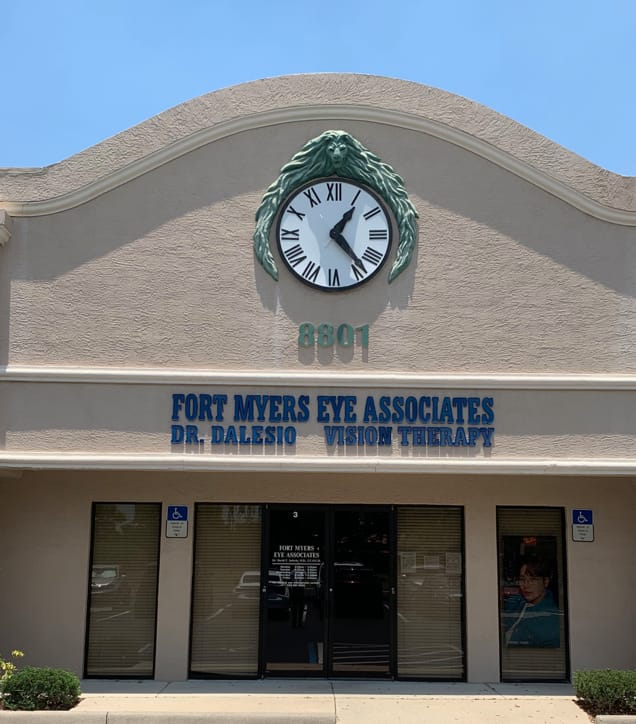Diabetes & Your Eye Health
Did you know eye exams can also detect early signs of diabetes? And, if you have been diagnosed with diabetes already, there are several additional tests your optometrist will perform at your eye exam to make sure your eyes are functioning properly.
Diabetes is a chronic condition that affects more than 34 million people in the US.
When food enters your body, it releases sugar into your bloodstream, which signals your pancreas to create insulin. If you have diabetes, your body doesn’t create or use insulin as it should, preventing your body from utilizing the sugar in your bloodstream for energy.
Over time, too much sugar in your bloodstream can cause health problems like vision loss, heart disease, and kidney disease.
Frequent eye exams will give you the best chance at healthy vision. Your optometrist can detect early warning signs of eye disease and provide you with preventative treatment options.
For diabetic eye exams in Fort Myers, visit Fort Myers Eye Associates today.


Diabetic Eye Disease
Even if your family doctor looks at your eyes when you go in for a diabetic check-up, it is still important to visit your optometrist regularly for in-depth testing.
During a diabetic eye exam, we will test your vision and the health of your eyes. If we find signs of diabetic eye diseases, we’ll let you know and recommend a course of action.
Diabetic Retinopathy
The longer you have diabetes, and if you struggle to maintain healthy blood sugar levels, you may be at higher risk for diabetic retinopathy.
The blood vessels in your eyes depend on healthy blood-sugar levels to operate. Diabetic retinopathy can restrict blood flow, causing the blood vessels in your eye to swell, leak, or close off. Abnormal blood vessels can grow in their place and cause further eye health concerns.
Macular Edema
When there is abnormal leakage or buildup of fluid in your macula, you may develop macular edema.
Your macula is responsible for the sharpness of your central vision. Fluid buildup can cause your macula to swell, which causes blurry or wavy vision in the middle of your visual field.
If diabetic retinopathy is left untreated, it can lead to macular edema.
Glaucoma
People with diabetes face a higher risk of glaucoma. There are numerous causes for different types of glaucoma. A common cause is increased pressure in the eyes, which can damage your optic nerve—which is responsible for sending visual images to your brain.
At first, glaucoma may not have any symptoms. Over time, glaucoma damages your vision, usually starting at the edges and moving inward. Glaucoma can’t be reversed, but your eye doctor can help you slow down its progression.
Cataracts
Cataracts can form more quickly in people who have diabetes.
Cataracts affect the crystalline lens in your eye, making it cloudy and causing blurred vision. Surgeries are available to replace your clouded lens with a clear one. Maintaining your blood sugar helps prevent cataracts from occurring and slow down cataracts that are already forming.

How We Protect Your Eyes
Seeing your optometrist regularly helps them detect early signs of harmful eye diseases.
Our optometrists can try to mitigate the harmful effects of eye disease and prevent as much damage as possible if they are detected early enough.
People with diabetes should have their eyes checked every year. If you are concerned about your vision or eye health, book an appointment to speak with us today.
See Us For Yourself
Find us on College Parkway between Winkler Road and Premiere Boulevard. We’re located east of the Cape Coral bridge. We serve Fort Myers, Cape Coral, Estero, Lehigh, and surrounding areas.


OUR LOCATION
- 8801 College Parkway Suite 3
- Fort Myers, FL 33919
CONTACT US
- Phone: 239.437.2004
OUR HOURS
- Monday: 8:30am – 5:30pm
- Tuesday: 8:30am – 5:30pm
- Wednesday: 1:00pm – 8:30pm
- Thursday: 8:30am – 5:30pm
- Friday: 8:30am – 4:30pm
- Saturday: Closed
- Sunday: Closed
Our Services
Our Brands

















